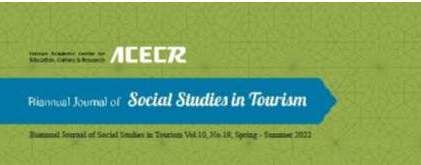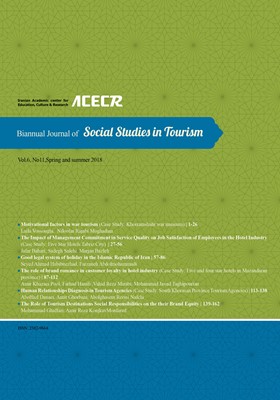The Role of Brand Romance in Customer Loyalty in Hotel Industry: The case of five and four-star hotels in Mazandaran province
Subject Areas :Amir Khazaei Pool 1 , Farhad Hanifi 2 * , Vahid Reza Mirabi 3 , 4
1 -
2 -
3 -
4 -
Keywords: brand romance, cognitive loyalty emotional loyalty, conative loyalty behavioral loyalty,
Abstract :
Brand romance is an important construct in marketing. It refers to a potential mental state in response to the brand and is created based on a strong positive emotion, arousal, and the dominance of a brand in the subjective mind of the consumer. The aim of this study was to test the effect of brand romance on the four types of customer loyalty, including cognitive, emotional, conative and behavioral loyalty. In the qualitative section, participants were customers who were selected using purposive sampling based on the saturation principle. In the quantitative section, the statistical population included the travelers of five and four-star hotels in Mazandaran province. Members of the statistical population were distributed based on the stratified sampling method. Classes were determined based on the number of hotel rooms. Collected data were tested using Smart PLS software. The results showed that brand romance had a positive and significant effect on the four types of loyalty in the hotel industry. The highest effect was on cognitive loyalty and the lowest was on behavioral loyalty.
ابوالمعالی، خدیجه (1391). پژوهش کیفی : از نظریه تا عمل. تهران: نشر علم.
داوری، علی و رضازاده، آرش (1392). مدل¬سازی معادلات ساختاری با نرم¬افزار PLS. چاپ اول. تهران: انتشارات جهاد دانشگاهی.
رحیم¬نیا، فریبرز، نجفی، مهدی و علوی، سید مسلم (1392). ممیزی برند و بررسی روابط میان شاخص-های آن در صنعت هتل¬داری (مورد مطالعه: هتل همای شیراز). فصلنامه علمی-پژوهشی تحقیقات بازاریابی نوین، 3(4)، 23-40.
رحیم نیا، فریبرز، فاطمی، سیده زهرا و هرندی، عطااله (1392). بررسی آثار متقابل ابعاد ارزش ویژه برند مبتنی بر مشتری (مورد مطالعه: هتل های پنج ستاره کلان شهر مشهد). مدیریت بازرگانی، 4، 1-20.
روستا، احمد، داور، ونوس وابراهیمی، عبدالحمید (1386). مدیریت بازاریابی. تهران: سازمان مطالعه و تدوین کتاب علوم انسانی دانشگاه ها (سمت).
Ascher, B. (1999), Dancing in the Dark: Romance, Yearning and the Search for the Sublime', Harper Collins Publishers Inc. N.Y. N.Y.
Aurier, P. & De Lanauze, G.S. (2011). Impacts of in-store manufacturer brand expression on perceived value, relationship quality and attitudinal loyalty. International Journal of Retail & Distribution Management, 39(11), 810–835.
Bolton, R. N., Kannan, P. K., & Bramlett, M. D. (2000). Implications of loyalty program membership and service experiences for customer retention and value. Journal of the Academy of Marketing Science, 28(1), 95–108.
Bowen, J. T. & Shoemaker, S. (1998). Loyalty: A strategic commitment. Cornell Hotel and Restaurant Administration Quarterly, 39(1), 37- 46.
Choi, T. Y., & Chu, R. (2001). Determinants of hotel guests’ satisfaction and repeat patronage in the Hong Kong hotel industry. International Journal of Hospitality Management, 20(3), 277-297.
Carroll, B. A., & Ahuvia, A. C. (2006). Some antecedents and outcomes of brand love. Marketing Letters, 17(2), 79-89.
Fournier, S. (1998). Consumers and their brands: Developing relationship theory in consumer research. Journal of consumer research, 24(4), 343-373.
Fraering, M. & Minor, S. M. (2013). Beyond loyalty: customer satisfaction, loyalty, and fortitude. Journal of Services Marketing, 27(4), 334 – 344.
He, H. Li, Y., Harris, L. (2012). Social identity perspective on brand loyalty. Journal of Business Research, 65, 648-657.
Holbrook, M. B., & Hirschman, E. C. (1982). The experiential aspects of consumption: Consumer fantasies, feelings, and fun. Journal of consumer research, 9(2), 132-140.
Hui, H. Huang, C. & Chen, P. (2010). Do reward programs truly build loyalty for lodging industry?. Department of Hospitality Management, 29(1), 128-135.
Hwang, J. & Kandampully, J. (2012). The role of emotional aspects in younger consumer-brand relationships. Journal of Product & Brand Management, 21(2), 98– 108.
Kayaman, R., & Arasli, H. (2007). Customer based brand equity: evidence from the hotel industry. Managing Service Quality: An International Journal, 17(1), 92-109.
Keller, K. L. (2001). Building customer-based brand equity: A blueprint for creating strong brands.
Kim, H. B., Gon Kim, W., & An, J. A. (2003). The effect of consumer-based brand equity on firms’ financial performance. Journal of consumer marketing, 20(4), 335-351.
Kim, K.H., Kim, K.S., Kim, J.H. & Kang, S.H. (2008). Brand equity in hospital marketing. Journal of Business Research, 61, 75–82.
Kruger, L. M., Kuhn, S. W., Petzer, D. J., & Mostert, P. G. (2013). Investigating brand romance, brand attitude and brand loyalty in the cellphone industry, Acta Commercii, 13(1), 1-10.
Kumar Roy, S., Butaney, G. & Bhutaney, B. (2009). Examining the effects of the customer loyalty states on the word of mouth, Pacific Asia Conference on Information Systems(PACIS), Association for Information Systems,
http://aisel.aisnet.org/pacis2009/85
Lawshe, C. H. (1975). A quantitative approach to content validity. Personnel psychology, 28(4), 563-575.
Liu, C. R., Wang, Y. C., Chiu, T. H., & Chen, S. P. (2017). Antecedents and outcomes of lifestyle hotel brand attachment and love: The case of Gen Y. Journal of Hospitality Marketing & Management, 1-18.
Min, H., Min, H. (1997). Benchmarking the quality of hotels service: Managerial perspectives. The International Journal of Quality & Reliability Management, 14(6), 68-90.
Miller, G. (1997). Approaches towards achieving sustainable tourism (Unpublished dissertation). University of Surrey, Surrey, UK.
Oliver, R. L. (1999). Whence consumer loyalty?. Journal of Marketing. Fundamental Issues and Directions for Marketing, 63, 33–44.
O’Callaghan E. (2009). Internal Branding and Brand Commitment: a Quantitative Investigation into Corporate Brand Building in a Retail Store Network, EIRASS conference, Niagara Falls.
Patwardhan, H., Balasubramanian, S. K. (2011). Brand romance: a complementary approach to explain emotional attachment toward brands, Journal of Product & Brand Management, 20(4), 297 – 308.
Patwarrdhan, H. (2004). The romance of brands: An interpersonal relationship approach to assess the antecedents and consequence of consumer attachment to the brand (Doctoral Dissertation), Southern Illinois University
Petzer, D., Mostert, P., Kruger, L-M. & Kuhn, S. (2014). The dimensios of brand romance as predictors of brand loyalty among cell phone users, South African Journal of Economic and Management Sciences, 17(4), 457-470.
Pullman, M. E. & Gross, M. A. (2004). Ability of experience design to elicit emotions and loyalty behaviors. Design Sciences, 35(3), 551-578.
Sarkar, A. (2011). Romancing with a brand: A conceptual analysis of romantic consumer-brand relationship. Management & Marketing, 6(1), 79-94.
Schouten, J. W., & McAlexander, J. H. (1995). Subcultures of consumption: An ethnography of the new bikers. Journal of consumer research, 22(1), 43-61.
Sreejesh S., Sarkar, J. G., Sarkar, A., Eshghi, A., & Anusree, M. R. (2017). The impact of other customer perception on consumer-brand relationships. Journal of Service Theory and Practice, https://doi.org/10.1108/JSTP-11-2016-0207
Shimp T.A. & T.J. Madden (1988), Consumer- Object Relations: A Conceptual Framework Based Analogously on Sternberg’s Triangular Theory of Love. Advances in Consumer Research, 15, 163-168.
Shoemaker, S., & Lewis, R. C. (1999). Customer loyalty: The future of hospitality marketing. International Journal of Hospitality Management, 18(4), 345–370.
So, K. K. F., King, C., Sparks, B. A., & Wang, Y. (2013). The influence of customer brand identification on hotel brand evaluation and loyalty development. International journal of hospitality management, 34, 31-41.
Tsai, S. P. (2014). Love and satisfaction drive persistent stickiness: investigating international tourist hotel brands. International Journal of Tourism Research, 16(6), 565-577.
Xu, B. J., & Chan, A. (2010). A conceptual framework of hotel experience and customer-based brand equity: Some research questions and implications. International Journal of Contemporary Hospitality Management, 22(2), 174-193.
Yeboah-Asiamah, E. Quaye, D. M. & Nimako, S. G. (2016). The effects of lucky draw sales promotion on brand loyalty in mobile telecommunication industry. African Journal of Economic and Management Studies, 7(1), 109-123.

